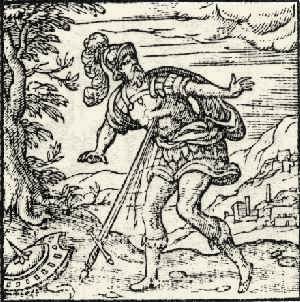Suicide
Christian doctrine held suicide to be a mortal sin*, committed only by those who had despaired of God's mercy. The act carried strong connotations of shame and horror*. Suicides might be refused burial* in consecrated ground and many were buried at crossroads -- a further punishment for souls who had lost their way in life. Religious authorities often confiscated the suicide victim's assets, leaving many surviving families destitute.
Suicide in Shakespeare's time was a paradoxical issue. On one hand, it carried the medieval Christian associations of shame and despair, yet, on the other hand, it was seen as a noble and courageous act in the growing Renaissance tradition of secular, gentlemanly honor. The motto, "death before dishonor," was at the heart of the courtly ideals which many Renaissance humanists derived from classical sources. Both Donne and Montaigne defend suicide (under certain circumstances) in their writings.
The Christian attitude toward suicide was embodied by the Biblical Judas*, while the classical tradition often held up the dramatist and philosopher Seneca* as the example of a noble suicide. A contemporary of Shakespeare who was caught up in the debate over suicide was Sir Walter Raleigh*, a well-known public figure who attempted suicide.
Footnotes
-
Suicide and theology
Although the Bible does not explicitly condemn suicide, it nevertheless became a mortal sin in the early church through the influence of popular morality and Augustine's important ecclesiastical work, The City of God. A particularly thorny and long-running theological debate involved the status of martyrs whose deaths were suspiciously close to suicide. In Shakespeare's time, John Donne examined the paradoxical issue of martyrdom in Biathanatos and Pseudo-Martyr.
Philosophers were also divided on the question of whether it was right for virgins to kill themselves to avoid rape or, like Lucrece (the tragic Roman wife), to kill themselves after being raped (see the next page). Augustine's position was that such women deserved compassion and pity, but were still sinners because their ultimate motivation was to protect their pride. This position was often challenged by many writers, including Shakespeare and Chaucer who both wrote poems sympathetic to Lucrece (Shakespeare's Rape of Lucrece and Chaucer's Legend of Good Women).
-
A terrifying end
More than any other sin, suicide carried with it a sense of horror because it prevented any chance for repentance or contrition after the sin was committed. Hanging was a particularly shocking method of killing oneself because, unlike poison or a knife, it silenced a victim's calling out to God for forgiveness at the last moment. Hanging was also suggestive of the well-known suicide of Judas, who despaired of God's mercy and hanged himself after betraying Christ.
-
"Maimèd rites"
In fact, suicides were not infrequently buried in consecrated ground, in the reasonable belief that those who committed suicide were of unsound mind at the time.
The issue of refusing Christian burial to suicides is the subject of a comical exchange in Hamlet. In the beginning of act five, two gravediggers are digging a grave for Ophelia and discussing whether or not she should be given a Christian burial since she apparently drowned herself.
A few interesting facts about Ophelia's death are revealed in the quasi-legalistic argument: that Ophelia's suicide could be forgiven if she had killed herself in self-defense ("se offendendo"); that a coroner's inquest had determined the status of Ophelia's death and had authorized a Christian burial; and that Ophelia's suicide was overlooked only because she was a member of the nobility. Later in the scene, Hamlet notices that Ophelia's funeral rites are "maimèd" (or incomplete), indicating that Ophelia died by her own hand.
-
Betrayal and suicide
The medieval church often sought to embody its doctrines in well-known images from the Bible. Judas Iscariot was the most significant suicide in Christian tradition since his betrayal of Christ led him to despair of God's mercy and hang himself. As suicide became closely tied to despair through the influence of Augustine and others, Judas emerged as the archetypal suicide in Christian theology.
(Shakespeare may or may not make reference to Judas' suicide just before Othello kills himself.)
-
An act of defiance
Seneca (who killed himself at the Roman Emperor's command) and the Stoics held suicide in high regard as a final act of defiance against the miseries of life. Suicide in Roman drama was often a dignified, rational act with none of the guilt or despair of Christian suicide. Although the hardships of the world could beat the tragic hero down, suicide enabled the hero to make one last theatrical gesture to affirm his or her free will.
This view of suicide was the antithesis of Christian doctrine, yet many Renaissance dramatists used the Roman connotations of suicide to establish a character's dignity and nobility, even in death. Shakespeare appears to draw on both connotations with the suicide of Othello.
-
"Hope and despaire live not together"
While Sir Walter Raleigh was imprisoned in the Tower in 1603, he made an unsuccessful attempt at suicide by stabbing himself. The knife was deflected by a rib, leaving Raleigh alive and well for his subsequent execution in 1618. In a letter left behind for his wife, Raleigh emphasized that his suicide was not an act of sinful despair:
Be not dismaide that I dyed in dispaire of gods mercies, strive not to dispute it but assure thy selfe that god hath not lefte me nor Sathan tempted me. Hope and despaire live not together.
The courageous manner in which Raleigh later faced his execution earned him a high reputation.
